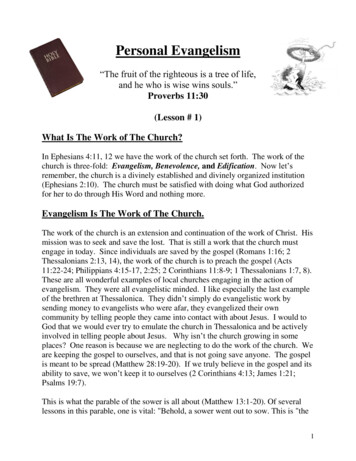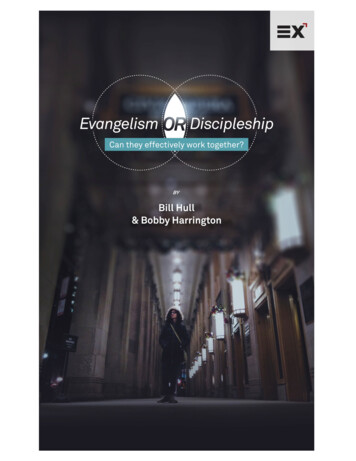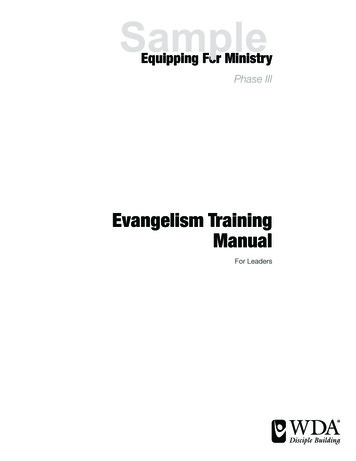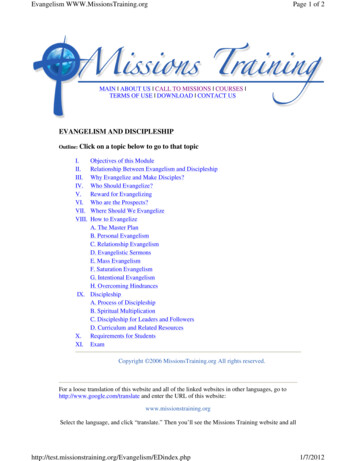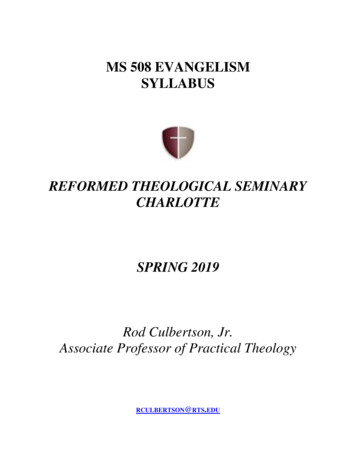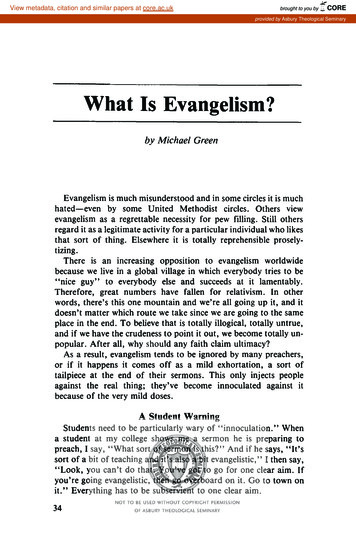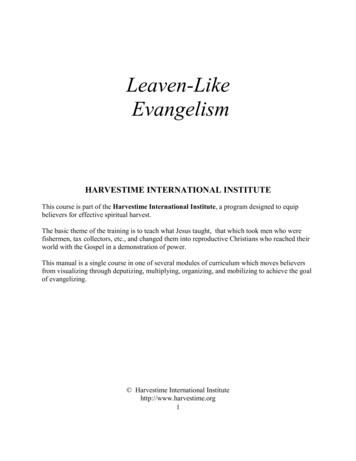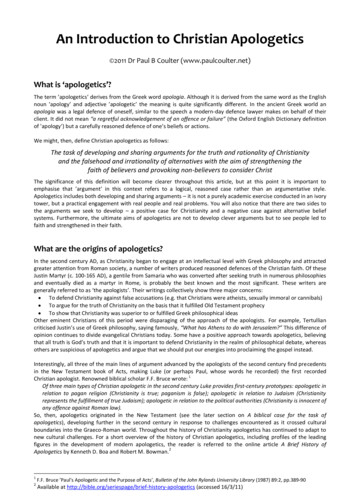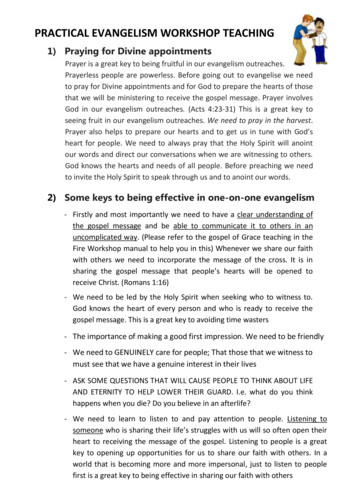
Transcription
Personal EvangelismMade Less DifficultGeorge C. Miladin
Personal EvangelismMade Less DifficultGeorge C. Miladin
1995 George C. MiladinAll rights reservedReprinted 2013Published by:The Committee on Christian Educationof the Orthodox Presbyterian Church607 N. Easton Road, Bldg. EWillow Grove, PA 19090-2539
INTRODUCTIONThis is not just another course, book, or manual on a subject that has been workedalmost to death. This course is designed to put shoe leather into our beliefs about thegospel. You might say it has to do with podiatry—“How beautiful are the feet of thosewho bring good news.”My original choice of title was “Propagating Presbyterians.” I have discarded that infavor of the present title for at least three reasons: (1) It was too restrictive; hopefully ourreadership will be much wider than one species of Christians. (2) The terms propagationand reproduction (as in Dawson Trotman’s Born to Reproduce) are descriptive of an effectthat is not in the hands of men to produce. Men by God’s grace can sow seed; only Godcan cause it to generate life. In this light, the original title was too man-centered. (3) Thepresent title, unlike the original one, strikes at the heart of a major problem and at thesame time offers hope.Personal Evangelism Made Less Difficult should be good news not only for most Presbyterian and Reformed people, who have the reputation of being some of the weakest evangelists among evangelical Christians, but also for most all believers. If we arehonest, the act of seeking out a fellow human being and telling him or her the gospel isa daunting experience. Even the great apostle Paul was faint of heart and of tremblingknees when he first entered the city of Corinth and thought about what lay ahead interms of preaching and personal evangelism. If, as studies show, contemporary man’sgreatest fear is public speaking (not flying in an airplane), then speaking the gospel tosomeone who isn’t a believer has to be near the top of the contemporary evangelical’sfear list. Supporting evidence is provided by the fact that so few believers get their feetgoing and their lips moving with God’s message. Not many of us do personal evangelism, offering the rationalization, “I witness by my life, not by preaching to others!”Since Scripture states that the feet of those who carry the gospel are beautiful andthat “good news” is a treasure committed to every believer, I offer this course in thehope that personal evangelism will be made less difficult for all of us. May the Lord ofthe harvest use it to correct us and to create in us a holy zeal and a confidence to do hiswill. May he bless our efforts along the lines of Psalm 126:6, “He who goes out weeping,carrying seed to sow, will return with songs of joy, carrying sheaves with him.”Many of the thoughts reflected in the first five lessons were gleaned at an OPC family camp almost thirty years ago. The speaker was Wallace Bell, who is today pastor ofPuritan Reformed Church in San Diego. For his insights I am much indebted and mostgrateful.George C. MiladinSan Diego, California19953
OVERVIEWIntroduction: Our goal is to understand personal evangelism in a new and fresh way, soas to overcome the obstacles that keep us from receiving the blessings associated withbringing God’s good news to others; and to actually bring the gospel to someone in need.Objectives:1. To work through a twelve-week outline on the subject2. To thoroughly acquaint ourselves with an evangelistic tool: the booklet Ultimate Questions,by John Blanchard3. To pray for the opportunity of using this booklet with someone who is in need of the LordIn other words, this is applied evangelism!Note: Selected Shorter Catechism questions and answers are employed in several lessons.Course OutlineLesson 1 The Definition, Imperatives, and Advantages of Personal EvangelismEvangelism—properly definedThe imperatives of evangelismThe advantages of personal evangelismAssignment: Review lesson 1, study lesson 2, and read all of Ultimate Questions.Lesson 2 The Difficulties and Rewards of Personal EvangelismThe difficulties: ourselves, unconverted man, our message, our adversaryThe rewardsAssignment: Review, study lesson 3, and read all of Ultimate Questions.Lesson 3 The Qualifications of a Gospel TellerSolid Christian characterHoly passion (zeal)Unwavering convictionGood understanding of: the message, people, and situationsDependence upon the Holy Spirit and prayerSpurgeon’s list of qualificationsAssignment: Review, study lesson 4, and read all of Ultimate Questions.Lesson 4 The Community of Evangelism (Acts 2:38–47)Uniquely created through the gospelMarked by a unique devotion to: apostolic teaching, fellowship, breaking of bread, prayerAssignment: Review, study lesson 5, and read all of Ultimate Questions.Lesson 5 The Message of EvangelismMan’s enormous need: his guilt, depravity, alienation, facing judgment, and helplessnessGod’s gracious provision: a fount of salvation, a mediator of salvation, the application of salvationAssignment: Read all of Ultimate Questions, outline the book, and study chapter 1, “Is anyonethere?” and chapter 2, “Is God speaking?” (pp. 4–7).Lesson 6 Ultimate Questions—A Tool of EvangelismThe various tools available (evangelistic literature)4
An outline of Ultimate Questions (twelve chapters)Discussion of chapter 1, “Is anyone there?” and chapter 2, “Is God speaking?” (pp. 4–7)Assignment: Study chapter 3, “What is God like?” (pp. 8–11).Lesson 7 Ultimate Questions—What Is God Like?Discussion of chapter 3, “What is God like?” (pp. 8–11)God is a (personal) SpiritGod is infinite, eternal, and unchangeableA note on loveGod’s sovereigntyPossible uses for this bookAssignment: Study chapters 4-7 (pp. 12–19).Lesson 8 Ultimate Questions—Man’s Enormous ProblemWho am I: God’s unique creation, originally perfectWhat went wrong: sin and its consequencesIs sin serious?The ultimate judgment—hellAssignment: Review and pray; study chapter 8, “Can religion help?” (pp. 20–21).Lesson 9 Ultimate Questions—Can Religion Help?What is religion?The failure of man-made religionAssignment: Study chapter 9, “Is there an answer?” and chapter 10, “Why the cross?” (pp. 22–25).Lesson 10 Ultimate Questions—God’s ProvisionJesus’ person and life on earthJesus’ work of salvation on the crossAssignment: Review chapters 1–10; study chapter 11, “How can I be saved?” (pp. 26–27).Lesson 11 Ultimate Questions—How Can I Be Saved?RepentanceFaithGod’s solid promiseThe benefits of salvationAssignment: Read all of Ultimate Questions; study chapter 12, “Which way now?” (pp. 28–30).Also, consider inviting a needy friend to join you in studying this book.Lesson 12 Ultimate Questions—Which Way Now?PrayerBible readingFellowshipServiceApplication and ConclusionBibliographyAldrich, Stephen. Life-Style Evangelism.Green, Michael. Evangelism in the Early Church.Lloyd-Jones, Martyn. The Heart of the Gospel.Packer, J. I. Evangelism and the Sovereignty of God.Pippert, Becky. Out of the Salt Shaker.Spurgeon, C. H. The Soul Winner.5
LESSON 1THE DEFINITION, IMPERATIVES, AND ADVANTAGES OFPERSONAL EVANGELISMIntroduction: Our goal is (1) to understand personal evangelism in a new and fresh way,so as to overcome the obstacles that keep us from receiving the blessings associated withbringing God’s good news to others, and (2) to actually bring the gospel to someone inneed.I. Evangelism—Properly DefinedEvangelism is a glorious essential of the Christian life.A. Etymology: ευ αγγελος well/good angel or messenger. To evangelize is to bringa good message or to tell glad tidings.B. Specific definition: “To evangelize is so to present Jesus Christ in the power ofthe Holy Spirit that men shall come to put their trust in God through Him, to accept Himas their Saviour, and to serve Him as their King in the fellowship of His Church”—Anglican Archbishop’s Committee of 1918.C. Harvie Conn’s definition: “Evangelism is when we say ‘Come on in and take alook.’ ” Place C on top of B and you have a porch leading into the front room.II. The Imperatives of EvangelismA. Indebtedness: Romans 1:14; 14:7.B. Commandment: (1) Matthew 28:18–20; (2) Acts 1:8. The words “to the very endof the age” and “to the ends of the earth” extend the responsibility of evangelizing thenations beyond the life and times of the apostles. Clearly the task is ours!C. Personal example: (1) Acts 8:1, 4; (2) Acts 11:19–21. Who stayed put? Who wasscattered? What did the scattered ones do? (Note: The verb in 8:4 and 11:20 isn’t theusual word for preaching, but more like “gossiping the gospel.”) Did it work? See Acts11:19–21.D. Love (the mightiest imperative of all): (1) 2 Corinthians 5:11, 14, 20. (2) 2 Timothy2:10. (3) “The love of Christ compelled me”—words on David Livingstone’s tombstone.(4) It was love that constrained the Lord Jesus Christ to leave heaven’s courts in order toseek and save us. Is it any wonder that Jesus said to his disciples, “As the Father has sentme, I am sending you” (John 20:21)?6
III. The Advantages of Personal EvangelismIn contrast to radio, TV, literature, etc., personal evangelism has these advantages:A. Everyone can do it: 1 Peter 3:15–16. “Bill/Tracy, what is it that gives you suchhope and keeps you going in the midst of hard times?” Out of a heart filled with JesusChrist you can “tell them how much the Lord has done for you” (Mark 5:19–20).B. Opportunities abound: There are ties that draw people heavenward. How wouldyou describe the following ties?1. John 1:35–372. John 1:40–423. John 1:45–46Discuss: Who, what, and where are your ties?C. It enables you to deal with the foundational problems of individuals. Peopleare “hurting” and broken in a thousand different ways. We know what the root problemis (sin), and we have the remedy (the gospel). We don’t need to be expert lawyers ordebaters, just witnesses (those who truthfully tell what they know).D. It gets us away from the professional idea.1. Contrast a product being sold by a door-to-door salesman with it being recommended by a trusted friend.2. Church-growth research reveals that of all the people attending an evangelical church, more than 90% are there as a result of a friend-to-friend contact (i.e., a friendinviting and oftentimes bringing them).Summary, Application, and ConclusionPersonal evangelism! We’ve defined it and looked at some imperatives and the advantages of it. Is it for us? Believing that it is, let’s resolve to be faithful in mastering thematerial in this course. In addition, let’s renew our resolve to pray for people—all kindsof people—asking God to soften their hearts toward the gospel. And let us pray thatChrist will increasingly dwell in our own hearts by faith (Ephesians 3:17), so that a holyzeal for reaching the lost will flow out from us. To God be the glory!Assignment: Review this lesson, study lesson 2, and read all of Ultimate Questions.7
LESSON 2THE DIFFICULTIES AND REWARDS OF PERSONALEVANGELISMI. The Difficulties of Personal EvangelismA. Ourselves: It is difficult to do personal evangelism for several reasons, including (1) the fallen, rebellious nature of the person we’re trying to evangelize, (2)our message, which goes against the grain of what the world believes, and (3) ouradversary—the Devil. But no difficulty outside of ourselves is greater than thosewithin us. Here are some things within us to be overcome:1. Lukewarmness: Revelation 3:15–16. This goes totally against what we arecommanded in Romans 12:11.2. Variableness of disposition and temper: Hot today, cold tomorrow. Thenorm is 1 Corinthians 15:58.3. Unpreparedness of heart and mind through lack of study and prayer:a. Such was the problem of the Hebrew Christians in Rome—Hebrews5:11–14.b. The importance of feeding on the Word is seen in 2 Timothy 3:14–17and 2 Peter 2:2.c. With respect to prayer—a primary means of grace:Martin Luther said, “He who prays well studies well.”Robert Murray McCheyne said, “Without this [prayer] I can do nogood to those who come and seek for me.”4. Feara. What are we afraid of? Discuss.b. Remedial verses for fear: Philippians 4:6–7; Isaiah 43:1–3; 1 John 4:18.5. Dislike of extremism: We don’t want to be “Bible bangers” or foot-in-thedoor, high-pressure evangelists who can make personal evangelism impersonal.6. That great American quality of optimism and fair play: It leads us to besinfully charitable concerning the spiritual state of our friends and loved ones, andconcerning what God ultimately will or won’t do with them.7. Unbalanced theology: Skewed Calvinism—“Why lose sleep over lostsinners; God has his elect and will call them to himself regardless of what we do.”(Note: The term Hyper-Calvinism properly applies to a group of seventeenth-centuryEnglish Puritans who denied the free offer of the gospel. They restricted the gospelproclamation to those who gave some evidence of desiring it.)Application: “Take heed to ourselves!”B. Unconverted man:1. His human nature is spiritually dead (Ephesians 2:1–2) and blind (John3:3).8
2. He has a natural enmity towards God (Colossians 1:21; Romans 8:7).3. His mind is in opposition to God (1 Corinthians 2:14; John 3:19; Romans1:18; 8:7).Because of this, the minds of men and women (young and old) are filled withthoughts that go against the truth of the gospel (e.g., evolution; nature supplantingGod; the inherent goodness of man; the reduction of man’s being and worth to thelevel of animals; a loving God devoid of holy wrath—“God wouldn’t send anyoneto hell”; no absolute moral standards—“everything is negotiable”; the legality andmorality of abortion, etc.). Such thoughts are not easily dislodged. Human beings arenot “reasonable.”C. Our message (the gospel): What that message is will be developed in detail; itwill be presented as the only answer (the solution) to meet the desperate need of unconverted man. As inherently and intrinsically glorious as the gospel is, unconvertedman (left to himself) is repelled by it. He fights against a message that declares theentire world to be under condemnation, worthy of death, and under God’s wrath—and that not only rules out all human works as contributing to man’s salvation, butalso represents man as totally incapable of responding to God’s offer of salvationapart from God’s enabling and amazing grace.He may lustily sing “Amazing Grace,” but when confronted by the truth contained in that song, he will reject it (even when dressed in his Sunday best).D. Our adversary: The Devil and his army of evil (demons and specially endowed men)—Ephesians 6:12; 1 Peter 5:8; 2 Corinthians 2:11; 11:13–15.Application: The above difficulties are real, not imaginary. They will not go awayby denial or wishful thinking. However, they can be overcome by prayer, the powerof God, and the Word of God, which assures us that “the one who is in [us] is greaterthan the one who is in the world” (1 John 4:4).II. The Rewards of Personal EvangelismWhile several rewards can be mentioned (e.g., being colaborers with God, thedevelopment of Christian character, the making of everlasting friends), two need tobe emphasized:A. The promise of a harvest: Psalm 126:5–6; John 15:16.B. The Lord’s commendation: Matthew 25:23.Application: There are difficulties in evangelism, which sometimes seem to be unconquerable mountains. However, these difficulties don’t erase or weaken the fourfold biblical imperative of indebtedness, commandment, personal example, and love.With the reward in view, we must face these difficulties head on, and take them tothe throne of grace, confident that our God is able to help us surmount them!Assignment: Review, study lesson 3, and read all of Ultimate Questions.9
LESSON 3THE QUALIFICATIONS OF A GOSPEL TELLERIntroduction (and Review): Up to this point, we have looked at the definition,imperatives, and advantages of personal evangelism (lesson 1). We have also considered the difficulties and rewards of personal evangelism (lesson 2), recognizing thatwe ourselves represent a rather large difficulty (especially our fears and lukewarmness). In this lesson, there is more about ourselves; later on we’ll come to our message. This order is biblical, for we are commanded in 1 Timothy 4:16, “Watch yourlife and doctrine closely.”There are qualifications for being a gospel teller. That should not surprise us, sincemost jobs and “offices” have them (e.g., police, firefighters, schoolteachers, doctors,elders, and deacons—see 1 Timothy 3 and Titus 1). When we examine the qualifications listed below, we will discover that they describe a healthy, growing Christianwhose chief end is to glorify and enjoy God.I. Solid Christian CharacterAmong other things, this involves the development of a Christian mind—theability to think Christianly. It also assumes a measure of suffering with a good attitude (see Romans 5:2–4).II. Holy Passion (Zeal)The Christian should have an earnest desire to see sinners saved and saints sanctified (growing in holiness). See Paul’s example in Romans 9:1–3, Galatians 4:19, and2 Timothy 2:10.The elements in this passion are:1. Love for Christ: both for who he is and what he has done for me.2. A concern for souls. See Paul’s example in Philippians 1:12-14; 2 Corinthians 5:11–15.3. A sense of urgency. “Now is the day of salvation” (2 Corinthians 6:2). Thatmeans today!George Whitefield was known as a “now preacher.” When he preached,people left knowing that the issue was heaven or hell.4. A sense of commission. Minimally, every believer is to have Christ setapart in his heart and be able to give a reason or a defense of the hope he has to everyone who asks (1 Peter 3:15). Maximally, some are called to be evangelists (fishersof men). Hopefully, the promise of John 15:16 applies at both ends of the spectrum—to the apostles and to every believer.III. Unwavering Conviction concerning:10
A. The condition of unrepentant sinners—lost!B. The truth, power, sufficiency, and free offer of the gospel (cf. 2 Peter 1:16; Romans 1:16; John 3:16; Acts 17:30).C. God’s acceptance of all who come to him through faith in Jesus (John 6:37).IV. Good Understanding of:A. The message, i.e., the gospel. A mastery of the booklet Ultimate Questions,which will occupy our attention from lesson five to the end of this course, will go along way towards meeting this critically important requirement.B. People—i.e., human nature. Satan understands how to deceive them. AsChrist’s messengers, we must be wise in our approaches and dealings with others, inthe hope that God will use us in “undeceiving” them.C. Situations. We must be alert to recognize and seize the opportunities beforeus. A good example of this is Dr. C. John Miller’s experience with diaconal evangelism in his early days in Uganda. Piles of garbage became an open door for thegospel. All that was needed was a big truck, upon which Dr. Miller and his associates piled the garbage, and on top of which he stood and proclaimed the gospel to anamazed and appreciative crowd.V. Dependence upon the Holy Spirit’s Power and upon PrayerA. Zechariah 4:6, “ ‘Not by might nor by power [of man], but by my Spirit,’ saysthe Lord Almighty.”B. Our Lord Jesus Christ, in his perfect humanity, embodied this dependence(see Luke 4:1; Acts 10:38).C. The early church (in Jerusalem) prayed on the strength of God’s sovereignty;according to Acts 4:31, supernatural results followed.VI. Spurgeon’s List of Qualifications As Found in The Soul-Winner: (1) towardGod: holiness of character, humility, earnestness, simplicity of heart, and surrender;(2) toward man: sincerity, love, unselfishness, and kindness.Application: After evaluating ourselves in light of the above qualifications, let’s prayfor solid Christian character, a holy passion, unwavering conviction, good understanding, dependence upon the Holy Spirit, and greater reliance upon prayer. Let’s also getserious about our evangelism prayer list. Who is going on yours? What or who aresome possibilities? What specifically are we going to ask for (e.g., an opportunity tobring them to a church service, or to direct a conversation to the big questions of life, sowe can give them the booklet; or an opportunity to invite them to a discussion groupthat uses our booklet; or a one-on-one study using the booklet)? Discuss this at length!Assignment: Review, study lesson 4, and read all of Ultimate Questions.11
LESSON 4THE COMMUNITY OF EVANGELISM (ACTS 2:36–47)Introduction: By God’s grace, the evangel—the gospel—has brought into existence acommunity that is like no other organization, group, or enterprise on the face of theearth.I. This Unique Community Came into Being and Continues to Grow as a Resultof the Gospel.A. Through Peter’s preaching, as recorded in Acts 2:36–41, the New Testamentcommunity expanded from one hundred and twenty people in the upper room tomore than three thousand.B. In response to Peter’s second recorded sermon—Acts 3:11–26—the number ofmale believers swelled to about five thousand (4:4). With women and children converts added, the church was now a sizable body.Application: The book of Acts demonstrates the power of the gospel as it movesacross the known world, beginning in Jerusalem and reaching to “the ends of theearth” (1:8). Since Jesus Christ is the same yesterday, today, and forever, we believerswho live near the end of the twentieth century should have the utmost confidence inthe ability of the gospel to conquer the hearts of twentieth-century men and women.The Christian congregations in the midst of which we live and work serve as a livingtestimony to the power of our message and its ability, when accompanied by Christ’sSpirit, to continue deepening and enlarging that community.II. This God-Created Community Is Marked by a Unique Devotion.A. The word “devoted”: The verb “devoted themselves to” in verse 42 (NIV)translates two Greek words that literally mean “were giving constant attention to.” Isthis not a characteristic of a devoted person (whether the object of devotion is sports,music, work, family, church, etc.)?B. Devoted to four things (verse 42):1. The teaching of the apostles: to God’s Word, in other words. The firstcentury believers came to faith and into the Christian community as a result of thepreaching of the Word. Now, in fulfillment of our Savior’s high-priestly prayer, theyare delivered to the Word to live by it and grow because of it (see John 17:17; Romans6:17). A good Old Testament example of a man devoted to the Word, its study andits teaching, is Ezra. According to Ezra 7:9–10, there was a significant relationshipbetween his devotion and the good hand of God resting upon him.2. The fellowship: This involves far more than coffee and donuts and potprovidence suppers. “The fellowship” was the community of believers whose focus12
and fellowship was with the Father and the Son in the power of the Holy Spirit. Inshort, those first-century believers were devoted to “one another” and to “one anothering” (i.e., caring for one another—shepherding). The outworking of this is seen inverses 44–46:a. Togetherness around a common pot (verse 44).b. Willingness to give up some possessions so that the basic needs ofspiritual brothers and sisters can be met (verse 45).c. Daily, loving fellowship that goes considerably beyond a “Sundaysmile” or a pat on the back (verse 46). There is no lone ranger Christianity here.A long time ago this pastor learned that the elders can’t do all of the shepherding of the flock. The truth is, God doesn’t intend for them to do it all. A carefulreading of Hebrews 12:15 makes this plain. Verse 15 begins with a participle from theGreek verb επισκοπεω, which should be translated “overseeing in such a way.” Whois to do this overseeing of the flock? The context indicates that every Christian is todo it. Surely this demands some kind of small group structure in our fellowships,where people can learn how to minister to each other, even carrying each other’sburdens.3. The breaking of bread: Mostly this is a reference to the sacramental meal.For the first two centuries, it was celebrated in private homes and other places, because church buildings were outlawed. A love supper often accompanied the Lord’sSupper. The believers devoted to each other made much of these meals; they weredevoted to that supper, which is a communion in Christ’s body and blood as well asa memorial of his death (cf. 1 Corinthians 10:16). We should not be surprised to findthe early believers occupied in such a way with meals—both common and sacramental—since Scripture informs us that heaven’s opening act will be “the wedding supper of the Lamb” (Rev. 19:9). Also, it should be noted that the few regulations thatcame out of the Jerusalem Council (Acts 15), which was the first truly ecumenicalcouncil, were largely for the purpose of encouraging table fellowship between Jewishand Gentile Christians.4. Prayer: The early Christians gave constant attention to prayer. The book ofActs is a history of the acts of the risen and reigning Lord Jesus through his peopleon earth by the power of the Holy Spirit. It is also a history of prayer in the earlychurch. The prayer meeting was the definitive meeting in the book of Acts. Thechurch moved forward on the wings of prayer. (See Acts 2; 4:23–31; 6; 9:11; 12:12–17;13:1–3, etc.)Application: This is first-love Christianity! Surely a more mature faith isn’tsupposed to diminish this fourfold devotion. It has implications for evangelism, forthis is the community where new converts will grow and thrive in their faith. That’swhy the Holy Spirit is pleased to add more members to it (Acts 2:47). Is this a pictureof your church? If not, why not?Prayer: Pray for fifteen minutes for our church life and for individuals and familieson your personal evangelism lists.Assignment: Review, study lesson 5, and read all of Ultimate Questions.13
LESSON 5THE MESSAGE OF EVANGELISMIntroduction: As for the contents of God’s message of good news—the gospel—there’sa lot of false fire being offered by Christians from pulpits and other places (“false fire”is an allusion to the event recorded in Leviticus 10:1–11). Many are reshaping the gospelto make it conform to the “needs” of people today. The result is a gospel that is “better” news than the old one that spoke of sin, judgment, and hell, and of the necessity forrepentance and commitment. The newer form of the gospel simply calls for belief of thefacts listed in 1 Corinthians 15:3–8. The ease of this gospel has contributed significantlyto numerical church growth, but there is a fatal flaw in it. The reshaped message may betailor-made for our fast-paced modern living, but it is not true to the Word of God. It isless than the true gospel message, and thus falls under the censure of Leviticus 10:1–11.It is of critical importance that every Christian understand God’s message of salvation. That gospel unfolds under two major headings: man’s enormous need, and God’sgracious provision.I. Man’s Enormous NeedHere we are speaking of real needs, not merely felt needs. The great preachers of thepast (as well as outstanding ones of today) stressed need, portraying fallen man as sick,drowning, and dead. “You need to be saved” was their great cry. We can analyze thatneed under five headings:A. Guilt: Sins are not mistakes; they are culpable infractions of God’s law and carrythe stigma of guilt and shame. There is only one plea that we can make in the court ofthe Almighty, as those who are laden with guilt and shame.B. Depravity: This painful term characterizes our fallen human nature that producessin, or from which our sin flows. According to God’s analysis, we sin because we are sinners—not the other way around. In his letter to the Romans, Paul first catalogues varioussins in chapter 1, and then explains the source of sin in 3:9–20—specifically, our hearts.Our Lord Jesus also spoke about the human heart in Matthew 15:16–20. And where doesthat sinful heart come from? The apostle answers in Romans 5:12–19 that it is inheritedfrom Adam.From our mother’s womb we are sinners (Psalm 51:5) and turn to sin instinctively. What child did we ever have to teach to pout, whine, lie, throw a temper tantrum,refuse to share a toy, etc.?C. Alienation: By nature we are enemies of God, no different from rebellious Adamin the Garden. We’ve all turned away from God and are set on going it alone and doingour own thing—we call this freedom. If the nonbeliever argues that he is no enemy ofGod, just kindly show him his obligation towards God—even the first and great commandment (Matthew 22:34–40); let God invade his personal liberties and the belligerent14
spirit will show itself.D. Facing judgment: We face God’s judgment not only in the future (Acts 17:31;2 Thessalonians 1:5–10; Matthew 25:31–46), but also in the present (John 3:36; Romans1:18).E. Helplessness: A mind that is darkened, a will that is enslaved, a heart of stone,and eyes that are blind—this adds up to spiritual helplessness and total inability. This iswhat we all are by nature, as fallen sons and daughters of Adam. Ironically, this bottomline assessment is especially repugnant to modern man, who sees himself as autonomous man very much in control of his environment.For an outstanding summary of the above five points, Shorter Catechism Questions18 and 19 are without peer:Q. 18. Wherein consists the sinfulness of that estate whereinto man fell?A. 18. The sinfulness of that estate consists in the guilt of Adam’s first sin, thewant of original righteousness, and the corruption of his whole nature, which is commonly called original sin; together with all actual transgressions which proceed from it.Q. 19. What is the misery of that estate whereinto man fell?A. 19. All mankind by their fall lost communion with God, are under his wrathand curse, and so made liable to all the miseries in this life, to death itself, and to thepains of hell forever.Application: For fallen man to see the enormity of his need requires the supernatural grace of Go
Our goal is (1) to understand personal evangelism in a new and fresh way, so as to overcome the obstacles that keep us from receiving the blessings associated with bringing God’s good news to others, and (2) to actually bring the gospel to someone in need. I. Evangelism—Properly Defined Evangelis
